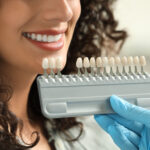Helping Children Brush their Teeth
Healthy teeth last a lifetime, and that’s why establishing a good dental routine with your child is essential. As soon as your baby gets his or her teeth, they need daily care and that is your job as a mom, dad or caregiver. Start with gently rubbing newly emerged baby teeth once a day with a soft, clean towel, then graduate to twice a day brushing with a soft toothbrush and a tiny dab of toothpaste. When your child’s teeth come together and begin touching each other, you’ll want to add flossing between teeth to the daily routine. It seems like a lot of work for a busy caregiver, but your diligence is well worth it. You help ward off the dreaded childhood cavities that cause unnecessary stress for both you and your child.
There does come a time, and it varies with each child, when the responsibility for clean teeth shifts from parent to child. While you still need to take an active role in ensuring good dental practices in the coming years, learning good dental hygiene is a life skill that will serve your child throughout his or her life. An interview with a mom of a four-year old gives some insight to how this can be achieved, without sacrificing good tooth care.
How old is your son, and does he brush his own teeth yet?
Eli is four, and while we encourage him to brush his own teeth, we know that now we need to take an active role in the process. We brush his teeth, all of them, with the right technique, and also floss for him. Afterwards, he is encouraged to brush his teeth himself. We know by watching that if he were left to do this on his own, his teeth would suffer. He isn’t consistent with reaching all his teeth, his technique is not good and he uses too much toothpaste.
When did you start flossing your son’s teeth?
We began flossing his teeth when he was three. He was a little concerned it would hurt, but after he watched his Dad floss his own teeth, Eli was OK with getting his teethed flossed too.
How long before you think he’ll be able to brush his teeth without help?
It’s hard to say, but it isn’t now! We set a good example — he sees that we care about our teeth and take good care of them, but he is just not ready at this point to do it all by himself. We’ll watch for signs of progress and gradually let him do more of the job on his own, as he gets better at it.
Young children learn to do many things on their own — put on their clothes and shoes, feed themselves, clean up their toys and help with simple chores around the house. But if they are not ready to do a really good job of brushing their teeth, don’t feel as if helping them to do so is “babying them.” They only get two sets of teeth, their baby teeth and their adult teeth. Don’t let their baby teeth (or their emerging adult teeth) suffer by giving your child too much independence in this area of life. Help them do a great job brushing and flossing until they are mature enough to do a great job brushing and flossing all on their own. Since many children are not capable of flossing correctly until they are ten years old, this may be a long process. But the day will come when they do a great job taking care of their own teeth and gums. When that day arrives, pat yourself on the back and smile – your job is done!
In the meantime, the Placerville Dental Group is here and ready to help with the teeth of your entire family. We look forward to seeing you regularly.



0 Comments